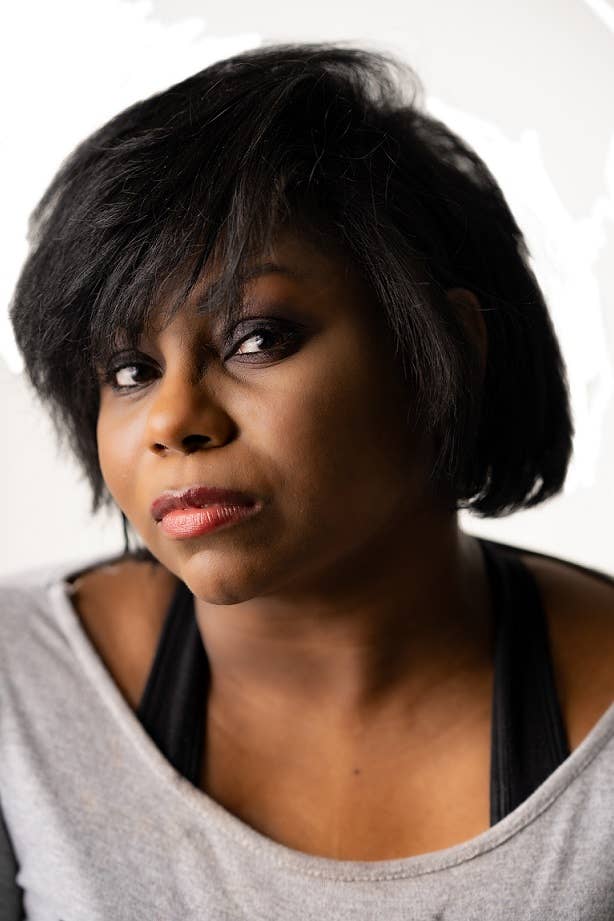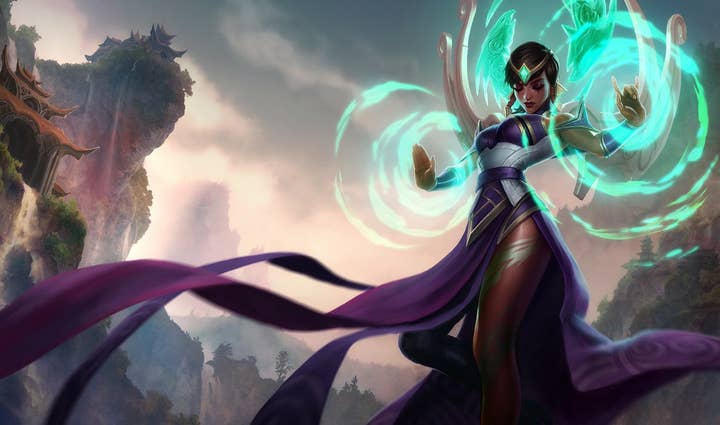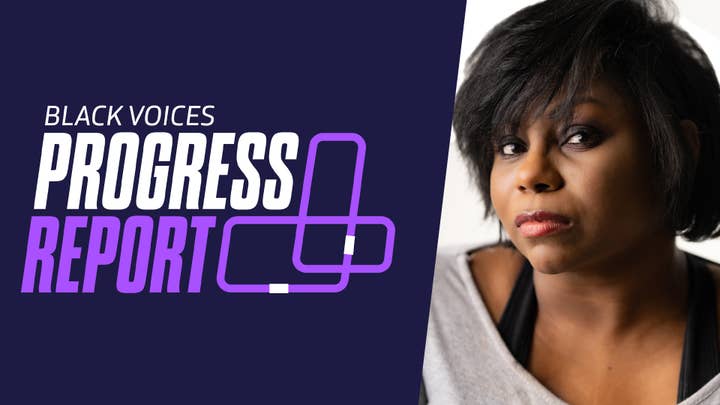Building a career on a dare | Black Voices Progress Report
League of Legends and Final Fantasy 7 Remake voice actress Danielle McRae discusses her path into and through the games industry
Sign up for the GI Daily here to get the biggest news straight to your inbox
This interview is part of GamesIndustry.biz's Black Voices Progress Report, offering insight into the different experiences Black professionals have in the games sector. You can read more about the project and check the other entries on this page.
Danielle McRae was interested in voice acting from a young age. She knew that people voiced the cartoons she watched, that someone somewhere had to record those lines as a job.
But when she told her parents about that interest, the reaction was mixed.
"At the time, my dad was like, 'Whatever you want to do, go out and do it.'" McRae tells GamesIndustry.biz. "My mom was like, 'I don't know, you gotta look at your skin color first. Do you think you're…'
"It's hard to say it, but it's the realistic brutal truth. If you're a Black kid growing up and you want to get into something like voice over, the first thing you're going to automatically think about – without even wanting to think about it but your brain is going to go there – are they going to hire me, based on my skin tone? I didn't want to go there as a kid, but come on. There's a lot of prejudice in the world and people are going to judge you based off your ethnicity."

These days McRae is a voice actress with an impressive list of credits across games, animation, and audio dramas. She has provided the voice for Karma the Enlightened One in League of Legends, Hagara the Stormbinder in World of Warcraft: Cataclysm, Gwen in Final Fantasy 7 Remake, and many more.
The seeds of her career were planted early, not just with her interest in voice acting but her affection for video games.
"As a kid, you couldn't give me a Barbie doll and have me just play with it," Rae explains. "I was Sid from Toy Story. I would take a toy and make a whole new toy and my dad didn't like that. So he was like, 'Hey, let me just get you a Super Nintendo and hope you don't take it apart and turn it into a whole new toy.'
The gaming interest stuck, and entwined itself with her budding professional interest when she played Metal Gear Solid, her first game with voice over.
"I was in college working at this café I really hated and my friend just happened to dare me because she knew I hated that place"
"I was like, 'Well you can't see people's faces. They could be any race, anything,'" McRae says. "That was when the wheels started turning a little bit… I probably would have gotten into voice over even if I didn't get into video games, but I think the video game thing kind of sparked the idea like, 'Well what if I can be up there? What if I could be the next voice actress that could be in a video game, an anime or animation?'"
Even so, sometimes people need a good nudge to go after the thing they want. A friend of McRae's obliged.
"I was in college working at this café I really hated and my friend just happened to dare me because she knew I hated that place," McRae says. "Like, 'Hey I dare you to spend $300 and take this voice over class with me. Would you do it?' And I was like, 'Hell yes, let's do it.'"
The class was about seven or eight hours of instruction at Bang Zoom Entertainment in the Los Angeles area, and served as an introduction to the basics of voice work.
"They were teaching us in those classes how to get into character and how to get into the mindset of the character, then we'd go into an actual working booth and record for an anime that was already done, but we'd go in for the experience," McRae said.
After the third class, her teacher pulled her aside and said he thought she was ready for professional work.
"They put my name on a casting list and they were saying, 'We can't promise that you're going to give you a job right away, but we want to put you on this list so you can audition for us and maybe something could happen out of this and you could book some stuff,'" McRae recalls.
Things started happening quickly after that.
"I booked League of Legends about a few months after I took the Bang Zoom classes," McRae recalls. "A month later, it was World of Warcraft, so it was kind of back-to-back. And when I booked that, I thought, 'This might be a regular thing.' And then a month later on Halloween, I booked SkullGirls, so it seemed like my career was starting to pick up momentum."

It's not uncommon for actors of any kind to work longer to get any kind of traction with their careers, and McRae invokes the phrase "overnight success" when thinking back on it.
"That's how it felt for me at the time, but for some people it takes a while," she says. "They'll do what's called a walla, where they'll do background voices for anime or video games, and it'll take them a year or a couple years before they get their first named role. It all depends on that actor's journey. For me, it just happened to be that I took some voice actor classes and it snowballed for the better."
Despite McRae's success, the "realistic, brutal truth" that her mother voiced concerns about still remains.
"I almost backed out of the industry because I was so fixated on, 'Are they going to focus on what I look like instead of what I can bring to them?'"
"The first thing you think about when you're Black growing up and trying to get into something like this is, 'Are they going to look at my skin tone before they even get to judge what I can do?'" McRae says. "That happened a lot when I was younger, and I almost backed out of the industry because I was so fixated on, 'Are they going to focus on what I look like instead of what I can bring to them?'"
She adds, "I still think that way. Every time I get a job, I think, 'Are they going to expect something out of me because I'm Black? Are they going to expect a certain voice or accent from me because I'm Black?'
"It still goes on in my head, but when I work in video games, anime, radio plays or audio dramas, there really isn't any of that. They're just like, 'We hired you because you did the best job you could and we love what you did.' So they pretty much judge you based off your talent. That's just my personal experience. I haven't had any negatives, which is really good."
There is one exception to that, however, and it's something McRae runs into with the audition process.
"I don't have the particular sound that these directors sometimes look for," McRae says, "so they'll ask me, 'Can you do this kind of like, McDonald's, kind of urban girl-next-door thing?' And I kind of get mad at that because there's not one sound for how a Black person sounds."
That doesn't happen as often as it used to for McRae, but she would like to see it stop entirely. And encouragingly, she feels able to speak up about it now without fearing that it will be held against her professionally.
"I'll do my best to call it out in a really polite, professional way," McRae says, "where I would just tell them, 'Hey, I'm not comfortable with this. Do you mind if we go with a different angle?' And a lot of times the people in charge of writing a script or the directors will be respectful of that. Sometimes they'll be like, 'Just read off the script.'"
She's also encouraged by the frequency with which casting directors are casting appropriately, finding Asian talent to voice Asian characters, Black talent for Black characters, and so on.
In general, she thinks the industry could be a lot better when it comes to its treatment of Black people, but acknowledges tangible progress has been made.
"It's slowly getting a bit better and people are starting to get educated on how the industry should be and how it should be way more welcoming," McRae says. "I long for the day when Black people in general don't have this feeling that we need to work, 10, 20, 30 times harder than our white peers or anyone who isn't Black. I long for the day when that doesn't happen anymore and it's equal for everybody, but we've got some more progress to go before we get there, unfortunately."
Sign up for the GI Daily here to get the biggest news straight to your inbox









